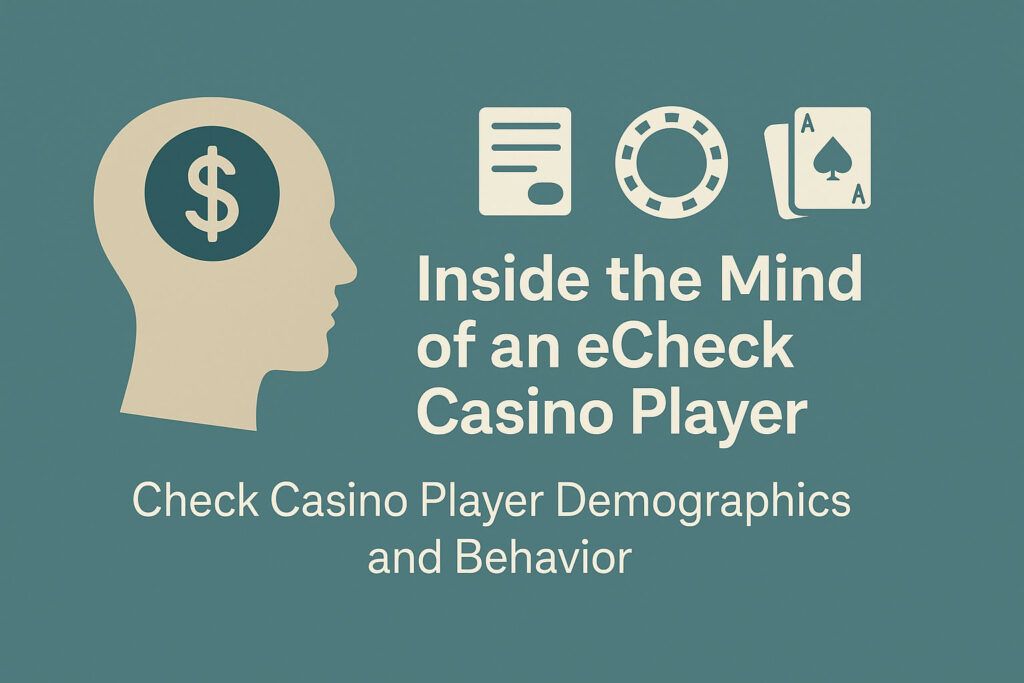
It seems true in iGaming that your deposit method of choice can say a lot about your personality. Since our site focuses on eCheck, we thought it would be appropriate in this piece to explore this particular demographic of players. We considered using the keyword “Profiling” in the title but decided against it, as it carries negative connotations. And we certainly don’t want to paint eCheck users in a bad light. However, as with anything in the world, iGaming attracts both good and bad actors — and we’ll cover the latter as well.
Here are some basic traits that eCheck players have (from our experience as affiliates):
- Loyalty
As fiat currency users, eCheck players tend to be remarkably loyal. By “loyal,” we mean they don’t typically hit and run — a behavior more common among crypto users, who often play on impulse and move on quickly. Non-fiat players usually don’t stick around in a casino’s player logs for long.
In contrast, our affiliate data shows that some eCheck users have been active with the same brand for a decade or more. They find a site they like — and they stay. Among all fiat methods, eCheck users seem to show the strongest long-term commitment. That makes sense: players using credit cards, prepaid vouchers, or gift cards generally don’t maintain relationships with a casino for years.
- Caution
Setting up an eCheck account takes time. First, you need to find an operator that supports it. Then, you need to understand the unlock conditions for that brand — and finally, you need to meet them. This makes eCheck unsuitable for impulsive players (like many crypto users), and instead attracts a demographic that leans toward caution and stability.
This also aligns with the average age of eCheck users, which skews higher than the industry norm. From our affiliate logs, eCheck is especially popular among players over 40, with strong adoption in the 30–39 range as well. At those ages, players tend to be naturally more cautious — and more likely to value a dependable, bank-connected payment method.
- Patience
This trait builds directly on the previous one — caution — but deserves its own spotlight. eCheck players need to be genuinely patient. As we covered in our eCheck unlock conditions article, most users are initially greeted by an empty cashier. That is, the eCheck logo simply doesn’t appear at first. This alone would deter most players seeking quick and easy deposit options. And even once they know what to expect, many still need to wait up to two weeks for the payment method to become visible.
That kind of delay would turn away the average user searching for a specific option — say, “MuchBetter” — who likely wouldn’t wait two weeks just to use their preferred method.
We also say patience applies doubly here because eCheck transactions themselves are slow. Withdrawals can take up to three days. All of this combined suggests that patience may be the most defining characteristic of eCheck gamblers to date.
- Deliberateness
This one is subtle — but undeniably true. An eCheck user never chooses this method on a whim. Often, they’ve used eCheck before in other contexts — such as eCommerce — and are seeking to replicate that experience in iGaming. That implies prior positive outcomes with the modality, making them a kind of “return user.” In other cases, they may have used eCheck in the past for online gambling and are simply looking for new brands that support it.
In general, there’s a certain meticulousness to how these players choose where and how to deposit. A sense of deliberateness you definitely won’t find when someone grabs a Vanilla Visa gift card off the shelf and jumps into the first casino they see.
Interestingly, we also think deliberateness applies doubly here — even among the bad actors mentioned at the beginning of this article. Fraudsters who exploit eCheck are not impulsive either; their activity tends to be methodical, calculated, and deliberate.
Up next, we’ll look at four behavioral traits that set eCheck fraudsters apart from typical users.
The Flip Side: eCheck Fraudsters
eCheck fraudsters are a very different demographic from the typical eCheck user. Some are unbanked; others are simply desperate — trying anything to recover losses. One of the most common tactics is attempting to free-roll the casino by charging back their deposit after play. This is, of course, illegal. These players often end up with their accounts banned and flagged on shared industry blacklists. In some cases, brands may even pursue legal action.
There are also more organized actors — small criminal syndicates that systematically look for weaknesses in how casinos process eCheck transactions. Their aim is usually to exploit lax KYC systems or slow cashier reviews to execute repeat chargeback fraud. This kind of behavior may have been more common 10 or 20 years ago, when regulation was lighter. But in 2025, with stricter compliance standards and advanced fraud detection, it’s a much harder game to play.
People have always tried to game the system. Think of the MIT blackjack team — immortalized in Ben Mezrich’s book — who turned card counting into a calculated art. Today, the methods have evolved. Instead of beating the house at the tables, fraudsters try to exploit legacy payment infrastructure, like eCheck, which still carries echoes of the old paper check system. In a way, it’s the digital evolution of check forging.
Because syndicates are mostly a thing of the past, we think most users who initiate eCheck chargebacks are simply people in distress. And not professional scammers. Whether due to financial hardship, mounting debt, or gambling-related issues, their actions reflect desperation more than design. We extend compassion to those individuals. And we gently urge anyone in that situation to seek healthier channels for stability and long-term financial recovery.
Final Thoughts: A Quiet but Loyal Demographic
eCheck casino players may not be the flashiest or most talked-about group in iGaming — but their behavior tells a clear story. They’re loyal, patient, deliberate, and often more financially grounded than users of trendier payment methods. Many are older, more cautious, and looking for a consistent experience they can trust over time.
In an industry that often rewards speed and novelty, eCheck users stand out by doing the opposite. And for brands that cater to this group — with transparent unlock systems, clear KYC processes, and reliable support — the payoff is long-term engagement, not short-term churn.
If you’re one of those players — or if you’re curious about what it means to play this way — you’re in good company.
Learn more about how eCheck works in Canadian casinos.





